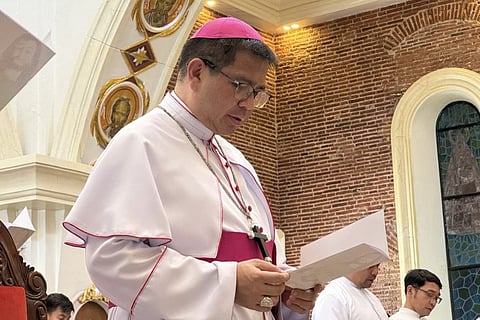
- NEWS
- the EDIT
- COMMENTARY
- BUSINESS
- LIFE
- SHOW
- ACTION
- GLOBAL GOALS
- SNAPS
- DYARYO TIRADA
- MORE

BALANGA CITY, Bataan — “We grieve because we experienced his love — and we love him.”
This was the message of Bishop Rufino C. Sescon Jr. of the Diocese of Balanga as he expressed sorrow and gratitude for the life and ministry of Pope Francis, whom he described as a figure of fatherly love and mercy.
Sescon said Bataan remembers the Holy Father as “a beacon of mercy, compassion, and humility who touched countless lives around the world.”
He recalled Pope Francis’ first appearance on 13 March 2013, which reflected the humility and simplicity that would define his papacy.
“His constant message was that God is merciful and compassionate,” Sescon said, adding that the Pope often emphasized an “encounter” — the importance of welcome, dialogue, and relationship-building in a synodal Church.
The bishop also looked back on the Pope’s January 2015 visit to the Philippines after typhoon “Yolanda,” describing it as a time of comfort and healing.
“That historic visit was marked by so many embraces. He embraced us. We embraced him,” he said.
As the Church mourns, Bishop Sescon finds strength in the example set by Pope Francis — one of mercy, humility and unwavering faith.
He shared a personal moment from that visit as part of the organizing team. “He allowed me to embrace him before he boarded the plane,” Sescon recalled.
He praised Pope Francis for leading the Church toward forgiveness and ecological care, citing the Jubilee Year of Mercy, the Synod on Synodality, and the encyclical Laudato Si’.
“He pleaded with us to care for our common home,” Sescon said.
Reflecting on his own appointment as Bishop of Balanga in December 2024, Sescon shared the Pope’s personal message to him: “He exhorted me to ‘show the face of Christ.’ I pray that I may be faithful to that mission.”
He ended with a farewell to the Pope, affectionately calling him Lolo Kiko: “Thank you, Pope Francis, for your embrace of mercy and compassion. Now it is your turn to receive the embrace of our merciful Father.”
As the Church mourns, Bishop Sescon finds strength in the example set by Pope Francis — one of mercy, humility and unwavering faith.
Meanwhile, Archbishop Emeritus Orlando B. Cardinal Quevedo paid tribute to Pope Francis, calling him the “Pope of the Periphery.”
Recalling their time together as members of the Synod of Bishops’ Ordinary Council from 2001 to 2004, Quevedo said he developed a close friendship with then Cardinal Jorge Mario Bergoglio.
“He was soft-spoken, humble, and kind. He gravitated toward the poor, the forgotten, and the marginalized,” Quevedo said.
The Filipino cardinal, who was appointed in 2014, noted that Pope Francis’ emphasis on reaching the peripheries marked a shift in Church priorities.
“His call to ‘go to the periphery’ became the Church’s mission,” he said, highlighting the Pope’s strong stance on social justice and environmental protection.
Quevedo also fondly recalled moments of humor with Pope Francis, including a lighthearted exchange during the papal visit to Manila in 2015.
“He personified compassion and the Church’s option for the poor,” Quevedo said. “He was the Pope from the margins — for the margins.”
